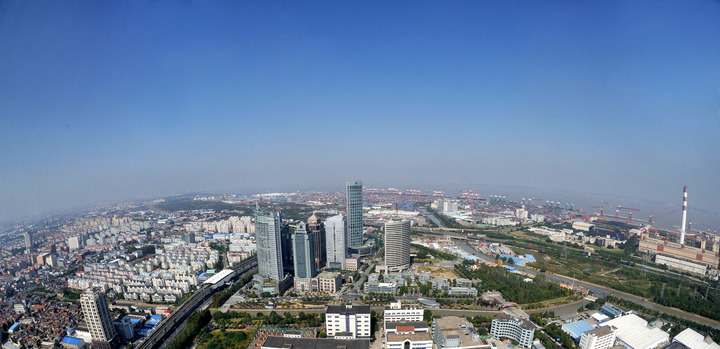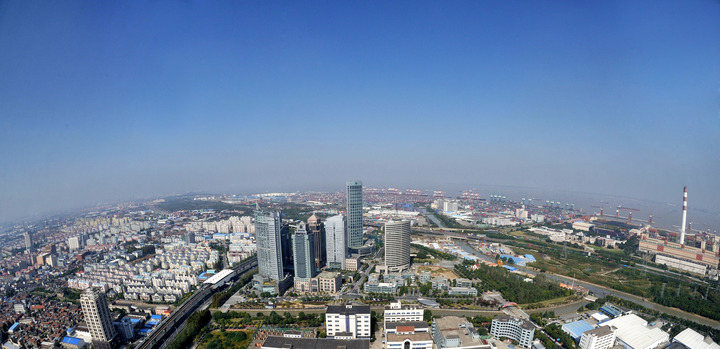
Photo taken on Oct. 29, 2013 shows the view of Waigaoqiao area of the Shanghai free trade zone (FTZ) as seen from a patrol helicopter, in Shanghai, east China.
BEIJING, Sept. 20 (Xinhua) -- As the year of 2023 marks the 10th anniversary of free trade zone (FTZ) construction, China assigned recently new tasks to bolster development of pilot FTZs via optimizing high standard rules aligning, market threshold and systemic integration of reform measures.
Chinese local governments are also enhancing institutional innovation and industrial development to better serve development of FTZs of higher quality to cultivate new growth engines for the economy.
-- Pilot FTZs play vital role in boosting opening up-driven development
On a recently-held news briefing, Shanghai listed multiple eye-catching innovations that it piloted ahead of others in building the China (Shanghai) Pilot Free Trade Zone, including the first negative list for foreign investment access, the first FTZ court and the first FTZ intellectual property court, and the first pilot import deal of re-manufactured products in key industries.
In the past decade, Shanghai, as a forerunner in building FTZ, vitalized its municipal economy via pioneering application of innovative rules and regulations. For instance, the east China metropolis hailed a batch of national leading foreign investment programs in dozens of sectors such as manufacturing and finance alongside debut and shortening of the negative list for foreign investment access.
Public data showed that more than 84,000 businesses registered in the Shanghai FTZ in the past 10 years and newly-established foreign investment programs amounted up to over 14,000 ones with actual paid-in foreign investment at 58.6 billion U.S. dollars.
Similar to Shanghai, the overall 21 pilot FTZs across China have given rise to formation of an opening up pattern involving the east, west, south and north China together with debut of the Hainan Free Trade Port.
These highlands of opening up have been functioning more explicitly in boosting local economy than the past. Currently, China's pilot FTZs have replicated and applied 302 innovative rules. In the first half of this year, they altogether reported actually-utilized foreign investment of 129.66 billion yuan, up 8.2 percent year on year and with less than one fourth of the land areas in China, these pilot FTZs attracted about 18.4 percent of foreign investment nationwide.
Zhang Xiaotao, head with the School of International Trade and Economics of Central University of Finance and Economics, attributed the achievements of China's pilot FTZs to their exploration of the innovative, integrated and differentiated reform measures of China as "testing fields" for institutional innovation.
At the same time, aligning related rules with high-standard international ones and participating in global economic governance system also improved China's say in formulating international economic and trade rules, according to Zhang.
-- Pilot FTZs in action in deepening opening up
Zhang Wei, deputy head of the Chinese Academy of International Trade and Economic Cooperation said FTZs played an important role in serving the national development strategies and improved effectively China's comprehensive competitiveness by creating new models of guiding high-quality economic development with institutional innovation.
Standing at a new starting point, China's pilot FTZs are embracing new tasks. In early June, China's Ministry of Commerce released a list of key work for pilot FTZs during 2023-2025 and later in late June, the State Council, the Chinese cabinet, issued documents to support five eligible pilot FTZs in Shanghai, Guangdong, Tianjin, Fujian and Beijing and Hainan Free Trade Port as well to pilot aligning their rules with high-standard international economic and trade rules.
Guided by these moves, China's pilot FTZs are busy optimizing work of three aspects, namely, high standard rules alignment, market threshold and systemic integration of reform measures to materialize the tasks.
Shanghai proposed to comprehensively align related rules with high-standard international economic and trade rules such as the Comprehensive and Progressive Agreement for Trans-Pacific Partnership (CPTPP) and Digital Economy Partnership Agreement (DEPA).
By focusing on trade facilitation, enlarging market access for foreign investment, cross-border data flow, and "behind the borders" rules penetration, Shanghai FTZ aims to create better business environment for market entities of varies types to invest and start business there.
In northwest China, China (Shaanxi) Pilot Free Trade Zone came up with deepening pilot economic and trade opening up measures by taking reference from those of the regional comprehensive economic partnership (RCEP).
For further optimizing market threshold, China (Jiangsu) Pilot Free Trade Zone vowed to speed up opening up-driven development of modern services industry, in particular the producer services sector and actively explore safe and orderly cross-border data flow, digital technology R&D and digital trade to break effectively obstacles in green trade.
In introducing industries, China's pilot FTZs are improving integration of their reform measures to better support local industrial development.
Shanghai FTZ turns eyes to solving obstacles and difficulties in developing bio-pharmacy, artificial intelligence, civil aviation and other key industries and strengthens institutional innovation in integrated upgrading of industries, guarantee of sci-tech innovation and opening of application testing scenarios to facilitate crafting of multiple world-class industrial clusters.
In Zhoushan Area of China (Zhejiang) Pilot Free Trade Zone, innovative rules featuring wider opening up relative to bulk commodities such as petroleum, natural gas and iron ore are implemented to shape itself into a distribution base for global bulk commodity resources.
Other pilot FTZs in Beijing, Liaoning, Hebei and Tianjin also revved up roll-out of plans to optimize the aforementioned three aspects to better leverage its regional and industrial advantages to pilot innovation.
According to Zhang Wei, China's pilot FTZs shall continue to determinedly deepen reform and expand opening up, and focus on aligning its rules with high-standard international economic and trade rules to constantly improve institutional opening up.
Meanwhile, Chinese local governments shall combine construction of FTZs with local economic development and craft differentiated but characteristic high-quality development modes to act as pioneers in further contributing to building the new development pattern in China. (Edited by Duan Jing with Xinhua Silk Road, duanjing@xinhua.org)




 A single purchase
A single purchase









